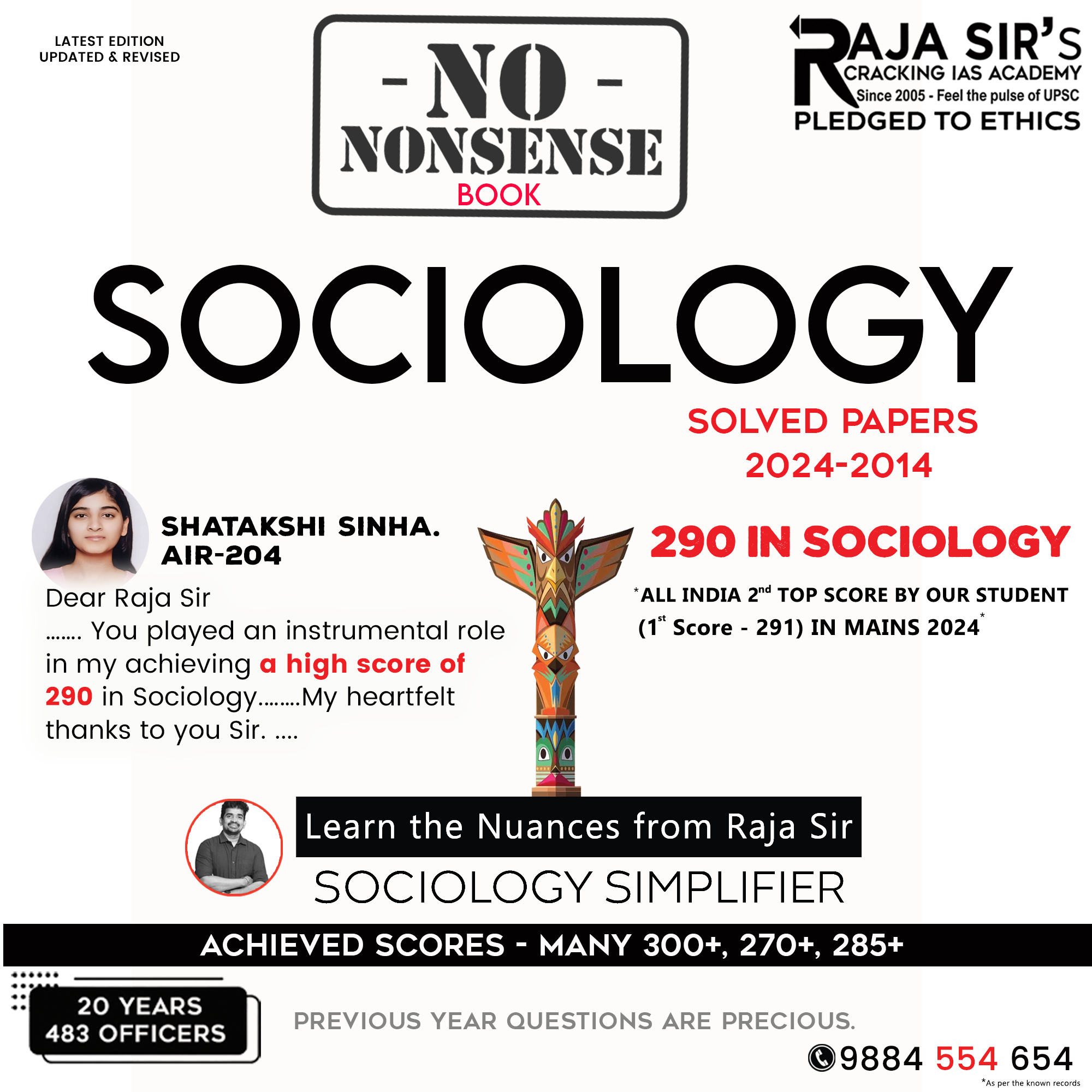- Home
- Prelims
- Mains
- Current Affairs
- Study Materials
- Test Series
Sociology should study society as a whole and not confine itself to the study of only limited social problems. Explain. (20 Marks)

The synthetic school of thought emerged in response to formal sociology and holds the view that sociology is a synthesis of all social sciences. Sociology is the science of sciences. It embraces all social sciences within its scope. In other words, it synthesizes them all. This conception of sociology is held by the sociologists Durkheim, Hobbes and Sorokin ,Hobhouse ,Ginsberg ,Alex Inkels, Mannheim share this view.
- The contention of this school is that all aspects of social life are interrelated; hence the study of one aspect of social life is not sufficient to understand the entire fact. For this reason sociology should systematically study social life as a whole.
- The subject mater of sociology and other social sciences is the same. But there is difference in their viewpoint. Society is the subject matter of all social sciences but they study it in their own perspectives.
- As sociology studies social life as a whole hence it is obvious that the scope of sociology is very wide.
Core Ideas
- Interconnectedness of Social Life: The Synthetic School posits that all aspects of social life are interrelated and cannot be studied in isolation.
- Sociology as a General Social Science: This school views sociology as a broad and integrative discipline, drawing from and contributing to various other social sciences.
- Beyond Specialized Studies: It rejects the idea of sociology as a purely specialized or formalistic discipline, emphasizing the need to synthesize different perspectives.
- Holistic Understanding: The Synthetic School aims to develop a comprehensive understanding of social phenomena by integrating insights from different social sciences.
Features
- Focus on Qualitative Data - The synthetic school prioritizes the collection and analysis of qualitative data, which provides rich, detailed information about individuals’ experiences, beliefs, and values. This approach allows sociologists to gain a deeper understanding of the meanings and motivations behind social behavior.
- Emphasis on Interpretation - The synthetic school seeks to understand how individuals interpret and make sense of their social experiences. By examining the meanings that people attach to their actions and interactions, sociologists can gain insight into the subjective experiences of individuals and the social contexts in which they live.
- Use of Non-Scientific Methods - The synthetic school emphasizes the use of non-scientific methods in the study of social phenomena. This includes the use of personal experience, intuition, and empathy to understand the perspectives of research participants.
- Subjectivity - The synthetic school values subjectivity in sociological research, meaning that researchers should acknowledge and embrace their own perspectives and biases in the interpretation of social phenomena. This approach recognizes that the researcher’s own experiences and beliefs can provide valuable insights into the social world.
- Contextualization - The synthetic school aims to understand social phenomena within their specific historical, cultural, and social contexts. By examining the unique circumstances and conditions that shape individuals’ experiences, sociologists can develop a more nuanced and complex understanding of human societies.
Thinkers
Emile Durkheim opines that the scope of sociology has three main divisions or field of study
(a)Social Morphology- Includes all those subjects which are fundamentally geographic such as population its size, density, distribution, mobility etc.
(b) Social Physiology - Social physiology has different branches such as sociology of law, sociology of religion etc. which are regarded as special sociologies. These branches deals with a set of social facts related to different social groups.
(c) General Sociology the philosophical part of Sociology. It aims at discovering the general character of social facts and to formulate general social laws.
Sorokin opines sociology studies various aspects of the social relationships hence cannot be called as a special science.
- the study of relationship between various aspect of social phenomena.
- the study of relationship between the social and non-social .
- the study of general features of social phenomena.
Alex Inkles opines that the scope of sociology includes social analysis, primary concepts of social life, basic social institutions and social processes.
The scope of sociology is vast, encompassing the study of every aspect of social life from small-scale interactions to the development of entire societies. The field is divided into two main schools of thought: the formalistic school, which emphasizes the use of empirical research methods and the search for causal relationships between social variables, and the synthetic school, which focuses on understanding the meanings and interpretations that individuals attach to their social experiences. Both schools contribute valuable insights and perspectives to the field of sociology, helping to advance our understanding of the complex and dynamic social world in which we live.










 Latest News
Latest News
 General Studies
General Studies